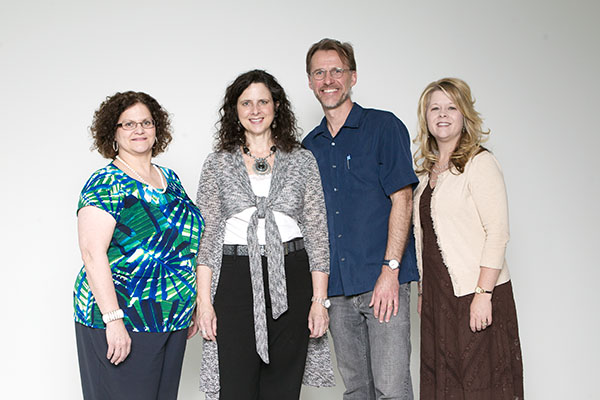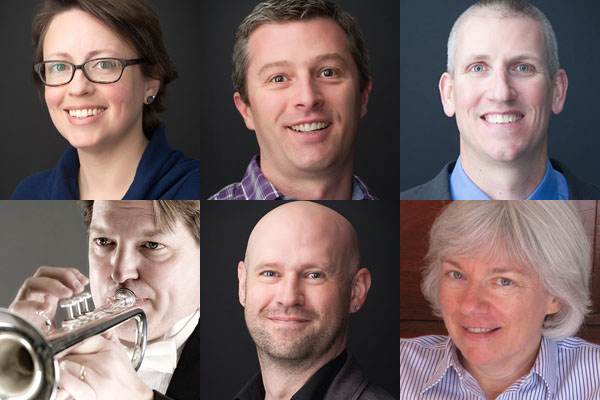BOONE, N.C. — Before becoming an assistant professor at Appalachian State University, Bob Eskridge was an accounting systems analyst for a major oil company, a city finance director, a city manager and an international advisor to the South African National Treasury. He had a wealth of real-world experience to offer his graduate students in public administration, but he had little experience teaching. Eskridge has experienced success in his career, and he has always been willing to work for it. When he saw an opportunity to enhance his teaching and contribute to the growth of his program, he seized the chance and became part of the second cohort of Appalachian’s Scholarly Teaching Academy.
Eskridge and nine other Appalachian faculty have spent the last two years studying, reflecting on and improving their teaching within a faculty learning community. The second cohort of the Scholarly Teaching Academy has completed its two-year commitment, and participants were recognized with a celebration and showcase on Oct. 27.
Scholars have documented a consistent theme of isolation among academics invested in scholarly teaching. An initiative of Appalachian’s Faculty and Academic Development office, the Academy aims to diminish the isolation for Appalachian faculty who want to continue their pursuit of teaching excellence.
These individuals commit two years to studying, reflecting on and improving their teaching within a faculty learning community. Academy participants work during the first semester of the program to set goals and develop an individualized Teaching Excellence Plan. This personalized plan, based on participants’ specific teaching context, provides an opportunity for them to articulate goals and objectives, activities to be completed, and resources needed as well as how to evaluate and disseminate their work. During the second year, participants implement their plans.
‘Commitment and enthusiasm’
As faculty consultant for the Academy, Tracy W. Smith of the Department of Curriculum and Instruction plans Academy meetings, develops programming based on participant needs, observes participants teaching and consults with participants on course, assignment or research design. She said, “It’s inspiring to see the commitment and enthusiasm among the teachers in the Academy. I often want to be a student in their courses. I know we have wonderful examples of teaching excellence all over our campus.”
Kate Brinko, director of Faculty and Academic Development, said the university benefits from the diversity of Academy participants. “What is truly amazing is that our Academy participants represent all ranks of faculty – adjunct non-tenure track to full professor,” she said. “And, they teach students in all parts of the curriculum – from First Year Seminar and general education to students in their major and online courses. These faculty are touching a multitude of students across campus.”
This cohort consists of 10 teaching faculty from seven different departments:
- Kathleen Adams, English (Rhetoric and Composition), College of Arts and Sciences
Focused on the development of an online metacourse, research and a revision of the use of technology in the classroom, and student engagement through integrated, collaborative and multimodal text assignments. - Pia A. Albinsson, Marketing, Walker College of Business
Focused on increasing student engagement in group projects/ service-learning projects with local non- and for-profit businesses as well integrating sustainability topics to increase student understanding and knowledge of sustainability in business. - Kim Becnel, Leadership and Educational Studies, Reich College of Education
Focused on analyzing student responses to service-learning assignments, modifying those assignments to maximize student engagement and learning, and crafting a coherent philosophy that expresses a belief in experiential learning and social constructivism. - Jennifer Dalton, Communication Disorders, Beaver College of Health Sciences
Focused on examining the practice of the Scholarship of Teaching and Learning (SoTL), including re-designing a course. Further, the experience enabled dissemination of learning to colleagues to develop a SoTL project using problem-based learning. - Robert Eskridge, Government and Justice Studies, College of Arts and Sciences
Focused on evaluating how the academic program delivers instruction to large distance education cohorts composed primarily of professional working students. The goal was to develop a hybrid delivery system, including one hybrid course to evaluate this delivery method for the program. - Tracy Goodson-Espy, Curriculum and Instruction, Reich College of Education
Focused on developing an understanding of exemplars of secondary mathematics lessons that maximize the instructional capabilities of interactive whiteboards (such as Smartboards) and related tools (such as Smart Notebooks) to promote student understanding and engagement. - John Henson, Curriculum and Instruction, Reich College of Education
Focused on designing a curriculum to cultivate effective production habits and collaboration in media studies programs. Specific components included developing course assignments and activities that foster social constructivist learning, identifying and curating media texts to support curriculum, and pursuing media production opportunities for professional development. - Jamie A. Parson, Finance, Banking, and Insurance, Walker College of Business
Focused on using technology to facilitate goals in integration and application of course concepts. Through various technological media, students evaluated potential legal issues and risk exposures. - Jon C. Pope, English (Rhetoric and Composition), College of Arts and Sciences
Focused on optimizing student engagement and skills transfer through the addition of a major face-to-face gamification project. In addition, collaborated with Academy colleague in library science as her graduate students completed a service-learning project and provided information literacy support and instruction to first- and second-year students. - Debbie Poulos, Communication, College of Fine and Applied Arts
Focused on designing a new First Year Seminar course around the topics of coffee and culture. A self-examination of current teaching methodologies resulted in increased incorporation of technology to engage students inside and outside of the classroom.
Kim Becnel from the Department of Leadership and Educational Studies in the Reich College of Education described the Academy experience as inspirational “as I have become increasingly interested in and involved with the scholarship of teaching and learning. Our group has discussed a variety of topics… and every bit of it has been helpful to me.”
More importantly for her, however, is the sense of community and support she said she has received.
“To hear others discuss pedagogical goals and challenges, openly revealing both their successes and failures, helped to free up my thinking, encouraging me to look carefully at my own pedagogy and engage in some creative problem-solving,” she said. “My peers in the Academy have given me wonderful memories, concrete ideas to implement in my own classes, the inspiration to continue my journey toward more effective teaching and learning, and the promise of future collaborations and continued friendships. I am so grateful for this experience.”
Long-lasting impact
As evidence of the long-lasting impact of the Academy, Geri Miller from Cohort 1 and the Department of Human Development and Psychological Counseling called the Academy “an oasis of professionals who have a love for and devotion to teaching.” She noted that the “encouraging philosophy of the Academy” has sustained her during difficult times as a professor both in and out of the classroom.
Faculty and Academic Development plans to open applications for a third cohort of the Scholarly Teaching Academy in Spring 2016 to begin in Fall 2016.
What do you think?
Share your feedback on this story.
About Appalachian State University
As a premier public institution, Appalachian State University prepares students to lead purposeful lives. App State is one of 17 campuses in the University of North Carolina System, with a national reputation for innovative teaching and opening access to a high-quality, cost-effective education. The university enrolls more than 21,000 students, has a low student-to-faculty ratio and offers more than 150 undergraduate and 80 graduate majors at its Boone and Hickory campuses and through App State Online. Learn more at https://www.appstate.edu.














